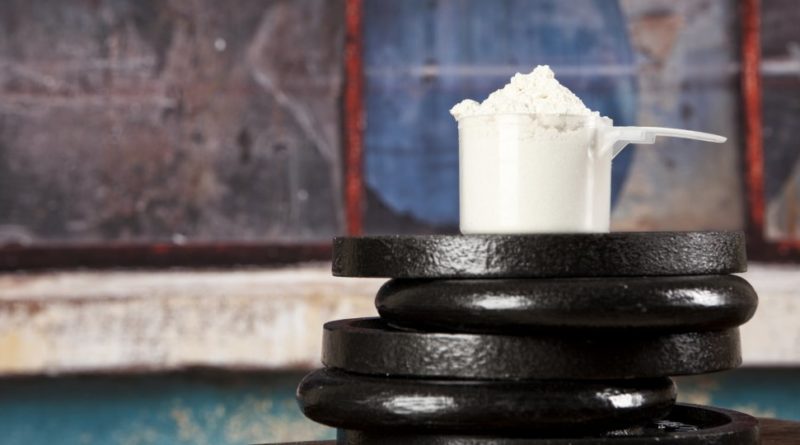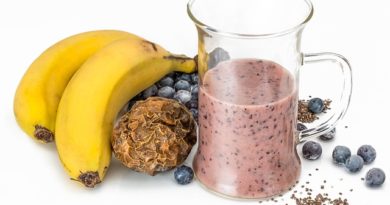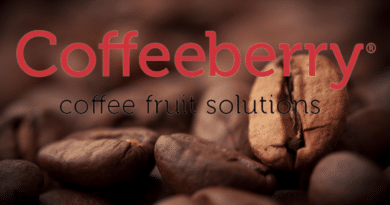Is Pea Protein As Good As Whey?
It may be hard to tell sometimes, but there are other types of protein powder that exist besides whey. Of course, there’s a casein option and then there’s team of plant-based alternatives to sift through. So, what about pea protein? Pea protein can deliver nearly just as much protein to your body has whey, but the key — especially for anyone on a vegetarian or vegan diet — is that it’s dairy-free, which is also kind of a big deal for the lactose-intolerant.
The powerful soy-free veggie protein isn’t exactly a “complete” protein, meaning it doesn’t have all the nine “essential” amino acids in its profile. But it does have a significant amount more of the amino acid arginine than whey. Arginine is a major player when it comes to building muscle. Plus, this type of protein is a slow-digesting supplement. Due to the soluble fiber that comes from peas, it’s able to help you feel fuller longer, which can help ignite weight loss.
Disclaimer: This article is for informational purposes only and is not meant to treat or diagnose any condition. It is recommended that you speak with your doctor before starting any exercise program, changing your daily nutrition, or adding any supplements to your regimen.
Table of contents
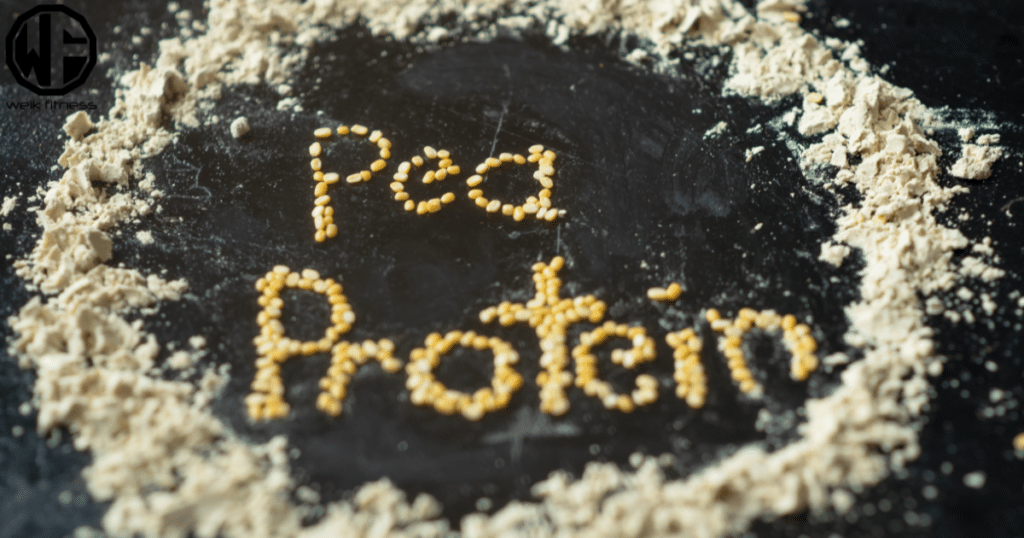
What is Pea Protein?
Pea protein is a high-quality protein source derived from yellow peas (Pisum sativum). It is commonly used as a dietary supplement and as an ingredient in various food products due to its nutritional benefits and versatility.
Key Features
- Protein Content: Pea protein is rich in protein, typically providing around 15-25 grams of protein per serving. It contains all nine essential amino acids, making it a complete protein source, although it is relatively low in methionine.
- Digestibility: It is highly digestible, with a digestibility score comparable to other protein sources like whey and soy.
- Hypoallergenic: Unlike dairy-based proteins (whey and casein) and soy protein, pea protein is hypoallergenic and suitable for people with allergies or intolerances to dairy, soy, or gluten.
- Sustainability: Pea protein is considered environmentally friendly due to the low environmental impact of pea cultivation. Peas require less water and fewer resources compared to other protein crops.
Benefits of Pea Protein
- Muscle Building and Repair: Supports muscle growth and recovery, making it popular among athletes and fitness enthusiasts.
- Weight Management: Helps in managing weight by promoting satiety and reducing overall calorie intake.
- Heart Health: May support cardiovascular health by lowering blood pressure and improving cholesterol levels.
- Digestive Health: Contains fiber, which can aid in digestion and promote gut health.

Uses of Pea Protein
- Protein Shakes and Smoothies: Often used as a base for protein shakes and smoothies due to its neutral taste and smooth texture.
- Baked Goods: Incorporated into recipes for bread, muffins, and other baked items to boost protein content.
- Plant-Based Products: Commonly found in plant-based meat alternatives, protein bars, and other vegetarian and vegan products.
- Supplements: Available in powder form for easy addition to various foods and beverages.
Nutritional Profile
- Calories: Approximately 100-120 calories per serving.
- Protein: 15-25 grams per serving.
- Carbohydrates: Low in carbs, usually around 1-3 grams per serving.
- Fat: Low in fat, typically 1-2 grams per serving.
- Fiber: Contains a moderate amount of fiber.
How to Incorporate Pea Protein into Your Diet
- Smoothies: Blend pea protein powder with fruits, vegetables, and liquid for a nutritious smoothie.
- Baking: Add to pancake batter, muffin mix, or bread dough for a protein boost.
- Soups and Stews: Stir pea protein powder into soups, stews, and sauces to increase protein content without altering the flavor.
- Snacks: Make homemade protein bars or energy balls using pea protein powder.
Pea protein is a versatile, nutritious, and environmentally friendly protein source that can easily be incorporated into various dietary preferences and lifestyles.
The Difference Between Pea Protein And Whey Protein
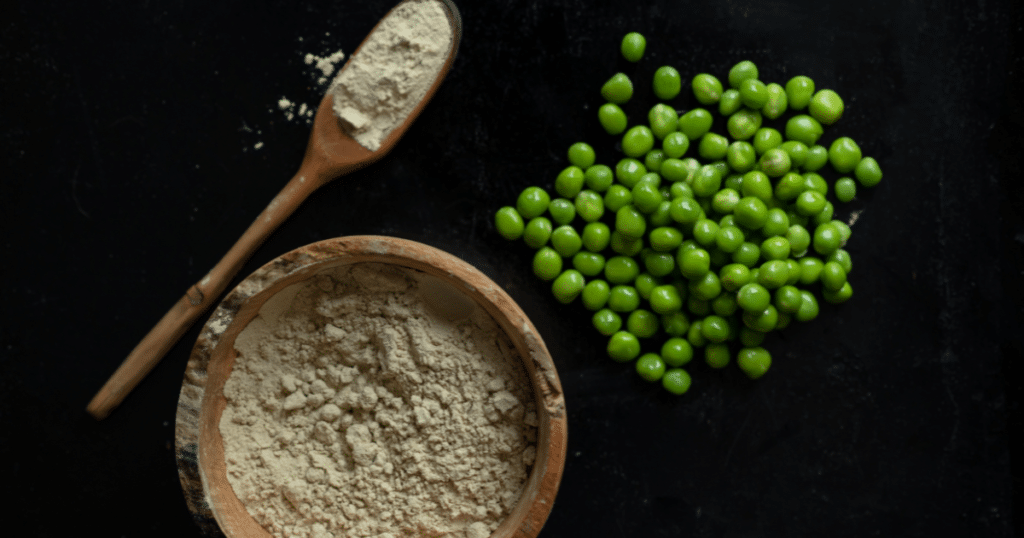
There’s always the question of whether vegetable protein matches up with whey protein powers, the standard for protein powders for most gym-goers. But side-by-side, pea protein stacks up pretty well. This type of protein offers almost the same amount of protein as a standard whey protein powders. There’s some difference when it comes to the amount of branched chain amino acids in the profile but pea protein can give you an almost identical protein boost as whey.
If you’re concerned about not having a complete protein profile, you can mix pea protein with another plant-based powder like rice or hemp protein. There’s also the taste that you should be aware of. Pea protein, like many plant-based proteins may have a more bland, chalky taste which can easily be combated by adding fruits, vegetables or almond butter to your mix.
Related Article: Pea Protein — The Future of Sports Nutrition?
The two proteins are almost identical looking at these specifications. But as we mentioned above, pea protein is much higher in arginine than whey. Arginine is a vasodilator and helps expand the blood vessels to make for easy transport of nutrients throughout the body. It also helps give lifters the pump while lifting in the gym.
The biggest upside of pea protein, is the fact that it can be utilized by a broader spectrum of our population. As shown in the benefits section, it is good for those who are lactose intolerant due to there being no dairy, it’s soy free, gluten free, and great for vegans.
Click here to continue reading…
Here are the products mentioned in the article:


*Disclosure: This article may contain affiliate links or ads, which means we earn a small commission at no extra cost to you if you make a purchase through these links. These commissions help support the operation and maintenance of our website, allowing us to continue producing free valuable content. Your support is genuinely appreciated, whether you choose to use our links or not. Thank you for being a part of our community and enjoying our content.
PLEASE CONSIDER SHARING THIS ON YOUR SOCIAL MEDIA TO HELP OTHERS LEARN MORE ABOUT THIS TOPIC.


